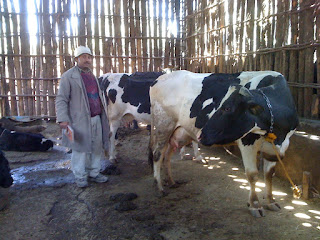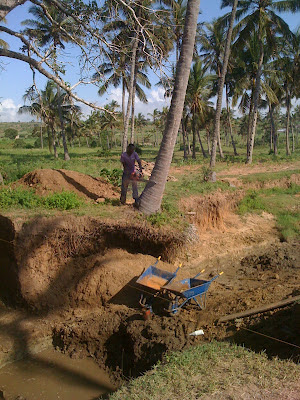Visiting Dairies in the Arsi District
This morning, Abera and I met with Mulgeta (whose job is the equivalent of a U.S. Extension Agent) for the Arsi District. He had accompanied us when we went to ATARC to implant embryos in August. I was impressed with him then and knew that he would be a good resource for us.
Mulgeta taught us about the dairy industry in this area and took us to several industry related sites. We started at the vet clinic where the farmers take their cows for treatment or to be bred. They had an arsi cow which was being treated by the vets for a severe case of mastitis, which is taken care of by the dairymen themselves in the U.S. We also watched their AI technician breed a cow. It sounds like the conception rates are very good, but it's difficult to tell, because the farmers don't keep very good records. It costs about 36 cents to breed a cow as compared to $25 to $40 in the U.S.
We visited the Bereket Dairy, which is a very progressive Ethiopian dairy with 15 cows, which is considered a large dairy here. They milk their cows three times a day. The mid-day milking is perfect timing for the afternoon coffee break. They are thinking about getting milking machines in the near future. The cows are fed atala, which is the waste from distilling corn, and wheat straw. The animals look very good and the heifers grow very well. They were breading their heifers at less than one year of age. I talked to them about using their manure as a fertilizer for gardens. We visited the milk collection center that they own, and learned how it worked. They sell most of their milk as raw, whole milk. What they don't sell, they churn to butter and then make into local cheese from the buttermilk. I did notice that they had a refrigerator and a freezer in their center, which is not common here.
We also visited a couple of medium size dairies with 5 cows each. They were feeding the wet distiller's grains to the cows also. It costs about 5 birr for 25 liters of the mixture. Each cow gets about that much each day in addition to the straw and water. As near as I can tell the only other supplement is oilseed cake which is soaked in water then given to the cows. Gitie, the owner of the one of the dairies had paid 12,000 Birr for a cow from HARC. It takes a lot of milk to pay yourself back for purchasing a cow that expensive. She averaged 18 liters a day, which would have her paying for herself in a year. We talked to them about ET and they said that they would like to learn. I will probably do some training in January when I come back.
These are some of the best dairies in the district. They are producing about 15 liters of milk/cow/day, which is three times the national average. The dairymen that we talked to were excited about learning more modern dairy techniques. They have seen the value of better genetics and better feeding, and want to learn more.
This evening we drove up to the bridge by Turgee. Brent, Lloyd, and the villagers have made a lot of progress on it. The best progress was infusing the local people with the understanding that they can make a difference themselves. They don't have to wait for someone to do it for them. It is a great success story!




Comments
Post a Comment